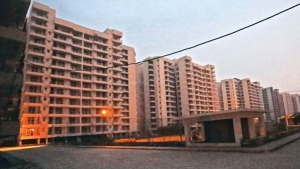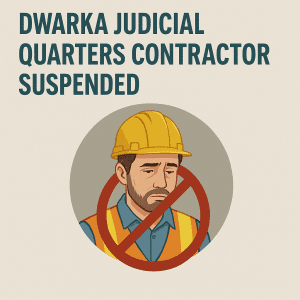New Delhi – In a significant move addressing accountability in public infrastructure development, Public Works Department (PWD) Minister Parvesh Verma has taken strict action against officials and a contractor involved in the construction of Dwarka judicial quarters that were demolished in December 2024 after being declared “structurally unfit.” The minister has suspended nine officials, initiated departmental proceedings against them, and called for an FIR against the contractor responsible for the failed project.
Severe Administrative Action Over Structurally Compromised Buildings
The controversy surrounding the Dwarka judicial quarters represents a major failure in Delhi’s public infrastructure development. After the residential complex was deemed uninhabitable before anyone could occupy it, Minister Verma expressed his shock at the situation and moved swiftly to hold those responsible accountable.

“It is shocking that an entire residential complex constructed for crores of rupees was found unfit even before anyone could start living there,” Verma stated regarding the Dwarka judicial quarters debacle. “We have asked the vigilance department to serve show cause notice to the nine officials concerned. We have also ordered an FIR be registered against the contractor and the balance payment be taken from him.”
The Dwarka judicial quarters were intended to provide residential accommodation for members of Delhi’s judiciary. However, structural deficiencies discovered in the buildings rendered them unsafe for occupancy, ultimately leading to their demolition in December 2024, representing a significant waste of public resources.
Also Read: MCD Panel Elections On June 2: Essential Revival of Delhi’s Stalled Governance
Officials Facing Disciplinary Action
The investigation into the Dwarka judicial quarters failure has implicated multiple officials at various levels of the PWD hierarchy. Among those found responsible for the substandard construction was a chief engineer who conveniently took voluntary retirement last November, potentially to avoid disciplinary consequences for the Dwarka judicial quarters fiasco.


In addition to the chief engineer, the list of officials facing action includes:
- Two superintendent engineers, one of whom has retired while the other has been transferred to the Central Public Works Department (CPWD)
- Four executive engineers, with two having retired and two others transferred out of PWD
- Two assistant engineers, one retired and the other transferred to CPWD
This broad sweep of administrative action underscores the systemic failures that contributed to the Dwarka judicial quarters collapse. The minister’s decision to pursue disciplinary proceedings against these officials signals a commitment to establishing accountability within the department for the failed project.
Financial Implications and Recovery Efforts
The financial aspects of the Dwarka judicial quarters controversy reveal significant public expenditure with little to show for it. According to official reports, the contractor had already been paid ₹24.89 crore out of the total project cost of ₹30.05 crore before the structural deficiencies came to light.
In response to these findings, Minister Verma has directed that ₹5.3 crore of the remaining payment be forfeited. Furthermore, he has instructed that the contractor be held financially responsible for the failed Dwarka judicial quarters project, demanding recovery of the balance of construction costs, estimated at approximately ₹35 crore.
“We have ordered that the balance payment be taken from the contractor,” Verma confirmed, emphasizing his determination to recover public funds misspent on the structurally compromised Dwarka judicial quarters. This financial recovery represents an important aspect of the minister’s response to the infrastructure failure, demonstrating a commitment to fiscal responsibility in public works projects.
Legal Ramifications for Contractor
Beyond the financial penalties, Minister Verma has taken the significant step of ordering that an FIR be registered against the contractor responsible for the Dwarka judicial quarters project. This escalation to criminal proceedings highlights the severity with which the government views the structural failures in the housing complex.


The filing of criminal charges suggests potential allegations of negligence, substandard workmanship, or even fraud in the construction of the Dwarka judicial quarters. While the specific charges have not been detailed in the minister’s announcement, the pursuit of an FIR indicates that authorities are treating the matter as potentially involving criminal liability rather than mere contractual violations.
This legal action against the contractor sends a strong message regarding accountability in public infrastructure projects and may set a precedent for how similar cases are handled in the future. The outcome of any criminal proceedings related to the Dwarka judicial quarters will be closely watched by stakeholders in Delhi’s construction and infrastructure development sectors.
Scrutiny of Replacement Project Costs
While addressing the failure of the original Dwarka judicial quarters, Minister Verma also revealed that plans for a replacement complex are under review due to concerns about inflated cost estimates. The minister expressed skepticism about the proposed budget for the new residential complex, which has been estimated at ₹171 crore.
“Officials gave an estimate of ₹171 crore for the new complex, at a rate of around ₹9,000 per square feet,” Verma explained. “The previous structure was built at around ₹35 crore. The new rate seems quite high and we will be reviewing market rates and other possible options.”
This heightened scrutiny suggests that lessons may have been learned from the original Dwarka judicial quarters debacle, with greater attention now being paid to both construction quality and financial prudence. The minister’s hesitation to approve the replacement project without thorough review demonstrates a more cautious approach to the development of the new Dwarka judicial quarters.
Implications for Public Infrastructure Oversight
The controversy surrounding the Dwarka judicial quarters raises broader questions about oversight and quality control in Delhi’s public infrastructure projects. The fact that an entire residential complex could be constructed at significant public expense, only to be deemed uninhabitable before occupation, points to serious deficiencies in the supervision and inspection processes within PWD.
The actions taken by Minister Verma in response to the Dwarka judicial quarters failure may signal a shift toward stricter enforcement of construction standards and greater accountability for officials overseeing public works. By suspending officials, pursuing criminal charges against the contractor, and scrutinizing cost estimates for the replacement project, the minister appears to be implementing a more rigorous approach to infrastructure development.
Timeline of the Controversy
The Dwarka judicial quarters controversy spans several years, beginning with the initial planning and construction of the complex and culminating in its demolition in December 2024. While the original timeline of construction has not been fully detailed in available information, the sequence of events highlights a prolonged period during which structural deficiencies either developed or went undetected.
The fact that several officials involved in the Dwarka judicial quarters project have since retired or transferred to other departments complicates the accountability process. The chief engineer’s voluntary retirement in November, shortly before the demolition in December, raises questions about whether there was advance knowledge of the impending controversy.
Closing Thoughts: Restoring Integrity in Public Works
The decisive action taken by PWD Minister Parvesh Verma regarding the failed Dwarka judicial quarters represents an attempt to restore integrity and accountability in Delhi’s public infrastructure projects. By suspending officials, seeking criminal charges against the contractor, and pursuing financial recovery, the minister has signaled that substandard construction will not be tolerated in public works.
As the investigation into the Dwarka judicial quarters continues and plans for a replacement complex are reviewed, the government faces the challenge of rebuilding not only physical infrastructure but also public trust in the PWD’s ability to deliver safe, quality construction. The outcome of this controversy may influence how future public infrastructure projects are planned, executed, and supervised throughout Delhi.
The Dwarka judicial quarters case serves as a stark reminder of the importance of rigorous oversight, quality control, and accountability in public infrastructure development. The lessons learned from this failure could lead to significant reforms in how construction projects are managed and inspected, potentially preventing similar costly mistakes in the future.

